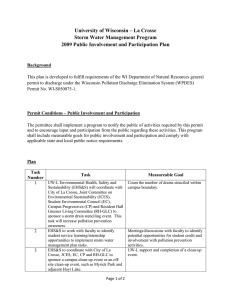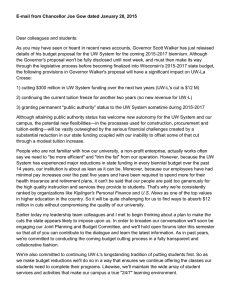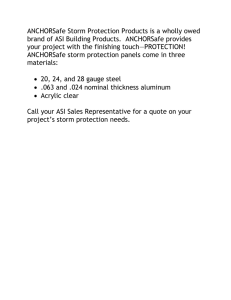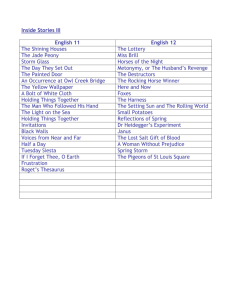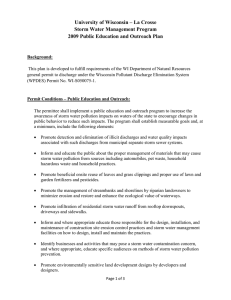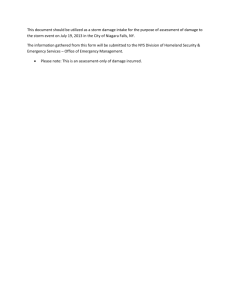University of Wisconsin – La Crosse Storm Water Management Program
advertisement
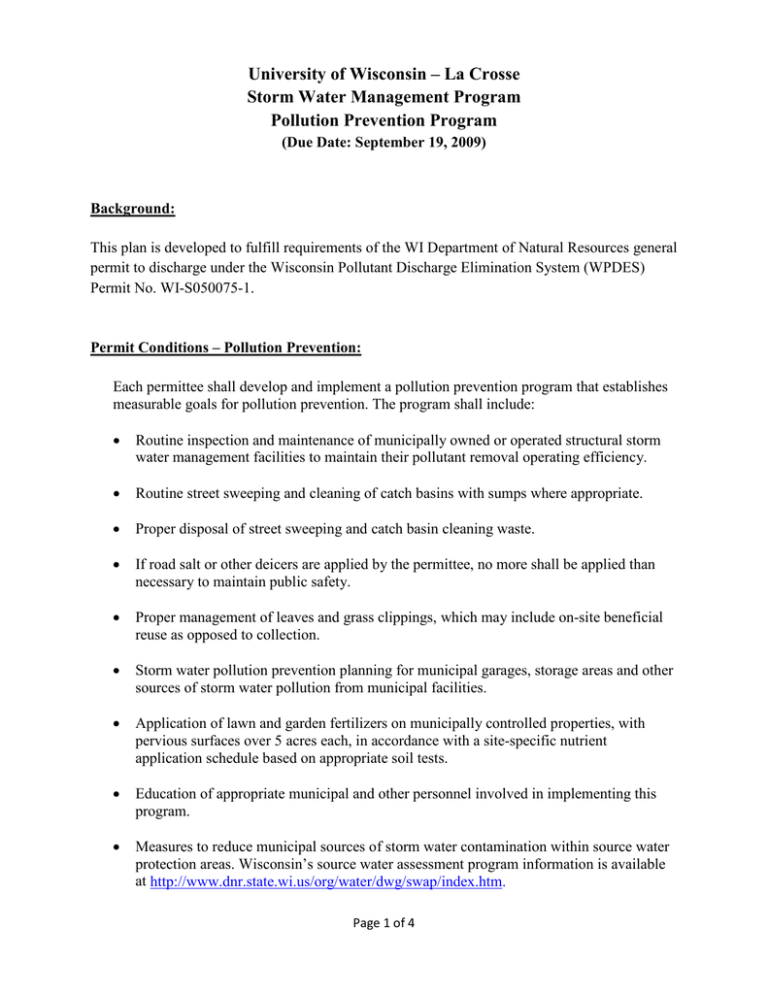
University of Wisconsin – La Crosse Storm Water Management Program Pollution Prevention Program (Due Date: September 19, 2009) Background: This plan is developed to fulfill requirements of the WI Department of Natural Resources general permit to discharge under the Wisconsin Pollutant Discharge Elimination System (WPDES) Permit No. WI-S050075-1. Permit Conditions – Pollution Prevention: Each permittee shall develop and implement a pollution prevention program that establishes measurable goals for pollution prevention. The program shall include: • Routine inspection and maintenance of municipally owned or operated structural storm water management facilities to maintain their pollutant removal operating efficiency. • Routine street sweeping and cleaning of catch basins with sumps where appropriate. • Proper disposal of street sweeping and catch basin cleaning waste. • If road salt or other deicers are applied by the permittee, no more shall be applied than necessary to maintain public safety. • Proper management of leaves and grass clippings, which may include on-site beneficial reuse as opposed to collection. • Storm water pollution prevention planning for municipal garages, storage areas and other sources of storm water pollution from municipal facilities. • Application of lawn and garden fertilizers on municipally controlled properties, with pervious surfaces over 5 acres each, in accordance with a site-specific nutrient application schedule based on appropriate soil tests. • Education of appropriate municipal and other personnel involved in implementing this program. • Measures to reduce municipal sources of storm water contamination within source water protection areas. Wisconsin’s source water assessment program information is available at http://www.dnr.state.wi.us/org/water/dwg/swap/index.htm. Page 1 of 4 Program Elements Note: The City of La Crosse performs routine inspection and maintenance of municipally owned or operated structural storm water management facilities, street sweeping, cleaning of catch basins and proper disposal of collected materials. As necessary, the University of Wisconsin – La Crosse collaborates with the City of La Crosse to fulfill permit conditions for City of La Crosse owned structural storm water management facilities within the campus-approved boundary. Element Element Description Number 1 Inspect and evaluate designated hazardous material storage rooms to ensure compliance with State and Federal spill compliance regulations. 2 Continue to implement the Spill Prevention Control and Countermeasures (SPCC) Plan to minimize the potential for oil releases into the environment. 3 Continue to collect and properly manage solid and hazardous waste/materials. 4 Evaluate the storage of all soil, sand and other erodible materials to ensure proper techniques are being used to minimize storm water pollution. 5 Road salt and other deicers are spread by UW-L Landscape Services on campus sidewalks and by contractor(s) in campus parking lots. A minimal amount of road salt and other deicer is applied to maintain safety. UW-L Landscape Services will evaluate deicing agents to identify the most effective and environmentally friendly deicer for sidewalks. The contract for maintaining parking lot plowing/deicer application will include a clause to use salt/sand judiciously for the joint benefit of maintaining safety and environmental quality. Page 2 of 4 Measureable Goal/Expected Results Perform periodic audits to monitor overall inventory and effectiveness of spill containment measures. Ensure hazardous materials are properly stored. Continued implementation of the SPCC Plan. Reduce the risk of oil entering the storm sewer system. Maintain records on the amount of solid waste, hazardous waste and hazardous materials disposed and recycled. Ensure waste materials are properly recycled or disposed. Monitor the locations where erodible materials are being stored to check for the possibility of storm water pollution. Prevent the storage of erodible materials on campus from causing storm water pollution. Monitor the amount of salt and other materials applied by Landscape Services and contract service providers to aid in snow and ice removal. Ensure snow and ice removal on campus is done in a manner that maintains public safety and minimizes storm water pollution. Element Element Description Number 6 All UW-L fleet and maintenance vehicles are washed inside the Maintenance and Stores building automotive shop, Landscape Services building or at an indoor commercial vehicle washing facility. The campus wash bays have sediment traps and discharge water to the sanitary sewer system. 7 The Landscape Services and Solid Waste Department continue to collect outdoor trash, leaves and other ground litter. This task includes monitoring storm drains within and along the campus boundary to clear surface obstructions of litter and debris as needed. To the greatest extent possible leaves are mulched in place. Leaves that cannot be mulched in place and other compostable materials are delivered to the City of La Crosse compost site. City generated compost is used on campus as necessary. The Solid Waste Department is evaluating the effectiveness of outdoor recycling bins and other methods to minimize litter and enhance campus recycling. 8 The application of all pesticides is conducted in accordance with State and Federal requirements. UW-L currently contracts out some services to licensed/ certified pesticide applicators. The Landscape Services Department employs five licensed commercial pesticide applicators in the nursery and turf category. UW-L continues to enhance upon an integrated pest management approach that begins with proper species selection for a given site. UW-L is enhancing diversity of plant species on as part of this integrated management approach. When use of pesticides is warranted we choose the least toxic option available that will be effective. Page 3 of 4 Measureable Goal/Expected Results Monitor operations and inform affected staff of the requirement to wash vehicles in facilities that do not negatively impact storm water quality. Eliminate illicit discharges from vehicle and equipment washing operations. Monitor the activities that the Landscape Services and Solid Waste Department undertakes regarding outdoor trash, litter and landscaping debris collection. Reduce the amount of trash, ground litter, and landscaping debris that enters the storm sewer system. Retain documentation on training and other records for staff designated as certified pesticide applicators. Reduce the quantity and toxicity of pesticides used on UW-L property and ensure proper application when they are used. 9 10 11 UW-L continues to implement and annually update a Landscape Nutrient Management Plan. The Plan covers all lawn and landscaped areas of the campus that receive nutrients and outlines the rates and frequencies that nutrients may be applied. The plan also covers best practices to follow regarding the application of these nutrients. Continue to educate campus employees on various pollution prevention programs that contribute to the enhancement of storm water quality. These programs include, but are not limited to: SPCC Plan, solid waste disposal and recycling, hazardous waste/material disposal and recycling. Continue to make use of a State negotiated contract to provide emergency response services for any hazardous material release that could negatively impact the environment. Page 4 of 4 Maintain records of nutrient applications. Ensure nutrients are applied in a manner that minimizes their impact on stormwater quality. Maintain records on the total number of personnel trained and training sessions offered. Improve awareness and active demonstration of work-related requirements to enhance storm water quality. The campus will record the number of spill incidents requiring activation of the State contracted emergency response service. The campus will continue to prevent hazardous material spill incidents that require activation of the emergency spill response contract.
